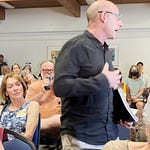There are two common strategies for siting controversial projects in neighborhoods:
Share preliminary concepts early and adapt them as necessary in accord with concerns.
Finalize crucial contingencies quietly before informing the public.
Blanchet House applied the worst combination of both approaches last month regarding Bethanie’s Room, a 75-bed overnight women’s shelter it intends to open at Northwest 17th and Lovejoy streets.
Blanchet House Executive Director Scott Kerman had planned to address only immediate neighbors at a hastily announced meeting May 31, but the NW Examiner got wind of the event and sent a Substack post to a thousand readers the day before.
When about 50 people showed up, Kerman assured them that things were at a preliminary stage and that fuller community engagement would come later.
Kerman apologized for the cramped quarters at The Triple Lindy, explaining that he had hoped to hold the event in the former bike shop to be converted into the shelter, but the sale had not been completed.
No one pointed out the contradiction in that moment, but Kerman’s revelation may reverberate as the community dialogue continues.
The agency’s plan was to finalize the sale before informing even the most immediate neighbors. In time, the neighborhood association and news media would be let in on it, but by then the course could be set in stone. Kerman said the facility could open as soon as October.
A man in the audience summarized the message he heard.
“You’ve told us basically that this is going to happen whether we are against it or not.
That seems out of order; the cart before the horse.”
“I’m sorry about that,” Kerman replied. “That needs to be updated.”
“But that’s what happened,” said the man, who would not give the Examiner his name. “You said it, and you did it.
“This magnet is going to be built whether we like it or not. You keep telling us you want community engagement, but it’s being done without community engagement. That’s obvious here.”
The man had another point, reflected in many comments made during the meeting.
“You’re washing your hands of anything that happens by blaming the city,” he said. “You’re going to try and maintain this space, but if something happens, that’s the city’s fault.”
Kyle Lookreddy, a neighbor of Rose Haven Day Shelter and Community Center at Northwest 18th and Glisan streets, had concerns based on that agency’s impact on neighbors.
“What I think we’re seeing again here is that people are coming in and deciding the community’s future based on their own ethics. It feels a bit like colonization. We’re going to come in and change your neighborhood because we have a belief that we’re doing the right thing, and we don’t need to listen to you.”
Lookreddy said Rose Haven held two meetings with community members and then discontinued them.
“Are you going to be open to being a member of the community and to have [communication] consistently going forward?” he asked.
“That’s our intent,” Kerman answered. “I appreciate skepticism born of past experience, even though that experience hasn’t necessarily been with us.”
Neighborhood leader miffed
Northwest District Association President Todd Zarnitz was particularly offended that his organization got no notice or personal invitation to the meeting.
“With zero notice given to the neighborhood, the city and county have apparently decided to fund and fast-track a homeless shelter in the Northwest District,” Zarnitz wrote the Examiner.
Blanchet House officials say the project will receive no city or county funding. Zoning and land-use approval is a city matter, however.
“The NWDA has been given no information, no notice and no opportunity for community input or feedback,” Zarnitz wrote.
“My understanding is that initially the shelter will be open to women, and be an overnight-only facility with up to 75 beds, but no guarantees that the scope could not be widened in the future. The facility will be operated by Blanchet House, which runs a homeless support center in Old Town.
“The NWDA has not had time to meet or talk about this development, so I can only offer my personal perspective at this time. Most of the neighbors I talk with seem to be open to doing our part to help impact the unsheltered homeless crisis, but with assurances.
“We don’t want to offer our help at the expense of increased violence, disorder and property crime. The city and county seem to be unwilling and/or unable to help in any of these areas and actually seem to be aggressively indifferent to citizens and the NWDA when we voice safety and livability concerns.
“Yesterday, I took a quick trip to Blanchet House to see how their primary location was impacting the surrounding neighborhood. The scene was more deeply troubling than I had hoped.
“Based on this vision for our future, I am worried that Blanchet House seems unable to handle the realities of fentanyl addiction.”
Zarnitz laid out measures that could reduce harm to neighbors:
Zero day-camping tolerance within three blocks.
A 24/7 security contractor that can respond to complaints within three blocks.
A point of contact for neighbor concerns and complaints.
No queuing on public property and sidewalks.
A contractor to daily clean up trash and graffiti within three blocks.
“I may call an NWDA special meeting to get a better sense of how the neighborhood feels about this development, and invite our representatives to attend,” he concluded.










